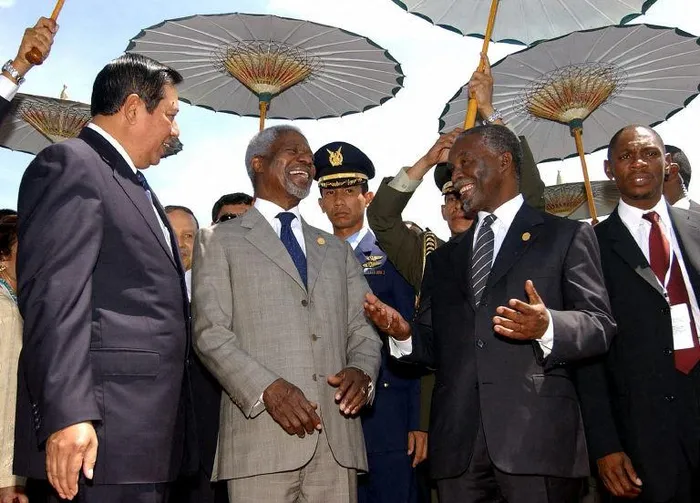Reviving the Spirit of Bandung in an Era of Geopolitical Uncertainty
SOUTH-SOUTH COOPERATION DAY

INDONESIAN President Susilo Banbang Yudhoyono (left) with United Nations Secretary-General Kofi Annan (centre) and South African President Thabo Mbeki after a tree planting ceremony held in Bandung on April 24, 2005 as part of the commemoration of the golden jubilee of the 1955 Asian-African Bandung summit. The 1955 summit gave birth to the Non-Aligned Movement. | AFP
Image: AFP
Alvin Botes
TODAY, the United Nations marks South-South Cooperation Day.
For those of us in the Global South, it is a moment to reflect on the genesis, trajectory, and future of an idea born of struggle, solidarity, steadfastness, and self-determination. It reminds us that the peoples of the South, long oppressed by colonialism, imperialism, and apartheid, have always insisted on shaping our own destiny. Ours is a living tradition that stretches from Bandung in 1955 to Johannesburg in 2025.
In April 1955, leaders from Asia and Africa gathered in Bandung, Indonesia, to chart a path beyond colonial domination and Cold War rivalry. The conference adopted the Ten Bandung Principles, namely:
- Respect for fundamental human rights and the UN Charter.
- Respect for sovereignty and territorial integrity.
- Equality of all races and all nations, large and small.
- Non-intervention in internal affairs.
- Respect for each nation’s right to self-defence under the UN Charter.
- Refraining from aggression or the use of force.
- Peaceful settlement of disputes.
- Promotion of mutual interests and cooperation.
- Respect for justice and international obligations.
- Abstention from collective defence serving big-power interests.
These principles echoed and complemented our own Freedom Charter, adopted in Kliptown the same year, which declared: “South Africa shall strive to maintain world peace and the settlement of all international disputes by negotiation – not war.” Bandung’s spirit gave birth to the Non-Aligned Movement in 1961 and the Group of 77 (G77) in 1964, creating the ideological and organisational foundation of South-South Cooperation.
For newly independent nations, South-South Cooperation was born of necessity. Colonialism left fragmented states, fragile economies, and weak institutions. Global resources were channelled into rebuilding Europe, while the South was told to wait. Independence was often conditional, tied to unequal treaties that entrenched economic dependency.
South-South Cooperation became a survival mechanism: pooling resources and solidarity to overcome structural disadvantages. Over time, it became a strategy—demanding the Right to Development, linking peace and prosperity, and pressing for reforms so that the majority of humanity could not be silenced by the few.
As Adekeye Adebajo observed, colonialism left behind “small, economically weak, and unviable states.” Through South-South solidarity, those states acquired the ability to negotiate, contest, and demand a seat at the global table.
Seventy years later, the Bandung vision resonates in a world marked by volatility, uncertainty, unpredictability, and great-power rivalry. Trade, tariffs, and supply chains are weaponised. The global North preaches cooperation while hoarding vaccines, subsidising its green transition, and expecting the South to absorb the costs of climate change without resources.
The world is multipolar, but fractured, with some powers pursuing transactional policies that undermine multilateralism and weaponize financial systems. For the South, these dynamics present both opportunity and threats: opportunity to diversify partnerships and secure fairer trade; the threat of being reduced to pawns—courted today, discarded tomorrow—in a renewed scramble. The Bandung lesson remains: our unity is our greatest shield.
Multilateralism, one of the principles of progressive internationalism, is under attack. The UN Security Council is paralysed by archaic veto politics. Multilateral treaties are weakened by selective compliance and disregard for international law.
Unilateral interventions and sanctions bypass the UN, threatening to unravel the system built after 1945. For the South, reform is existential: a more democratic Security Council, a fairer trading system, and stronger multilateral finance mechanisms are essential to level the global field.
Nowhere are the contradictions and crises of multilateralism and international law clearer than in Palestine. The genocidal war waged by apartheid Israel—using starvation as a weapon, targeting civilians, and attacking neighbours—continues with impunity. The North expects the South to obey international law while granting its allies immunity.
South Africa’s case before the ICJ is a defence of the very survival of international law. If the Genocide Convention can be violated without consequence, then no treaty is safe and no people secure. For the South, this is the litmus test of whether law or raw power governs the international system.
For South Africa, South-South Cooperation is a living history. Our liberation was sustained by the solidarity of the South. As Kofi Annan reminded the G77: “Unity is one of your greatest assets.” Today, unity and solidarity are not optional—it is existential. Climate change, pandemics, debt crises, inequality, and the struggles for self-determination in Western Sahara and Palestine cannot be solved by nations acting alone.
On this South-South Cooperation Day, we must recommit to the Bandung spirit. Just as leaders in 1955 refused to be silenced by colonial powers or divided by Cold War blocs, so too must we refuse to be fractured by today’s rivalries. Our agenda is development, peace, and dignity.
South-South Cooperation is the instrument of our liberation, our development, and our future. Its history is written in Bandung and Kliptown, in Belgrade and Havana. Its present is written in Johannesburg, Brasília, New Delhi, and Beijing. Its future must be written together, by the collective will of the Global South, —rooted in our history, guided by our principles, committed to a just, inclusive, and equitable global order.
* Alvin Botes (MP) is the Deputy Minister of International Relations and Co-operation, a member of the ANC NEC, and its Subcommittee on International Relations.
** The views expressed do not necessarily reflect the views of IOL, Independent Media or The African.